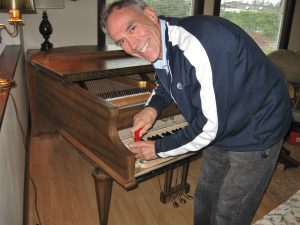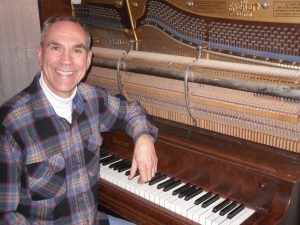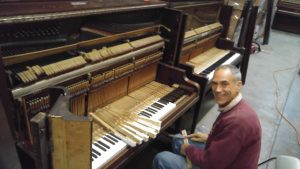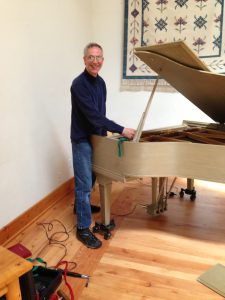Dean’s Story: Birth of a Tuner
“So tell me, Dean, how did you get started tuning pianos?”
My mother bought a Baldwin grand piano and I began taking piano lessons when I was five years old. All through grade school, high school and college I was very active with music. From fourth grade through college I played the violin in orchestras, quartets, and ensembles. Although I was an English major in college, I sang in the choir, the madrigal group and my own barbershop quartet. During my four years at Willamette University I sang, danced, and acted in every play, musical, opera, and stage production. My sophomore year I was the stage manager. At least once or twice every single day I was singing, sight-reading, or doing something musical, to the point that anyone could come up to me out of the blue at any time and ask me to sing a particular note and I was able to sing it exactly in tune.
 Even my fraternity sang serenades for sororities; we happened to be the most skilled and in-tune group of fraternity singers, so the sororities loved to have us come. There was one classmate who sang next to me who was always a little off-key. One day he told me that he knew how to tune pianos. I thought to myself, “Wait a minute. If he can tune pianos, I can tune pianos” – a concept that had never before occurred to me.
Even my fraternity sang serenades for sororities; we happened to be the most skilled and in-tune group of fraternity singers, so the sororities loved to have us come. There was one classmate who sang next to me who was always a little off-key. One day he told me that he knew how to tune pianos. I thought to myself, “Wait a minute. If he can tune pianos, I can tune pianos” – a concept that had never before occurred to me.
One day after class I was in the gym helping set up chairs for an event. Everyone had left and I was about to leave when I heard someone come in. From the back of the gym I watched as a lady escorted a blind man over to the first of two grand pianos that were sitting in front of the stage risers. He proceeded to open the piano and to take out some tools. I stayed as he began to tune the piano. I thought to myself, “Wow. What a lonely job. He can’t see, there is no one to talk to in this big empty room, and it’s going to take him forever to tune all the wires in those pianos. What a bleak life.”
In October, my friend Rob asked me if I would play my fiddle for a square dance. He was one of the more daring students who actually lived off campus. He and a couple friends had rented a farmhouse that had a barn and a big field south of town, and they were getting some bales of straw and planning a big Halloween party. Of course I agreed, and got directions. The barn party was fun: I played my fiddle, taught dances, danced myself, and had a great time. By around 2:00am most of the people had left, and those of us who were still there ended up sitting around upstairs in the farmhouse. I was slumped on the couch while people were talking. Directly in front of me against the wall was an old upright piano that was open. The front and bottom boards had been removed and there was a tuning hammer standing up on one of the tenor tuning pins. I asked Rob about it, and he told us that he was tuning the piano. He had been working on it for a couple weeks and wasn’t finished yet. I was amazed that he could do that. How on earth did he know how to tune a piano?
The final moment that confirmed my determination to learn to tune pianos happened when my favorite  college professor invited his favorite class to his house one evening. His name was Wright Cowger, and he owned a beautiful farm in Scio, Oregon. As he was showing us around, I was impressed with how many skills he had to master in order to maintain this farm in addition to being a college professor. We went into his house where we met his German wife. They loved each other that day as much as they did the day they met. As we stood in the kitchen I looked into the living room at their large grand piano. When I commented on the piano, Wright casually mentioned that he always tuned his own piano. That did it. When he said that, I knew that I was going to have to learn how to tune pianos.
college professor invited his favorite class to his house one evening. His name was Wright Cowger, and he owned a beautiful farm in Scio, Oregon. As he was showing us around, I was impressed with how many skills he had to master in order to maintain this farm in addition to being a college professor. We went into his house where we met his German wife. They loved each other that day as much as they did the day they met. As we stood in the kitchen I looked into the living room at their large grand piano. When I commented on the piano, Wright casually mentioned that he always tuned his own piano. That did it. When he said that, I knew that I was going to have to learn how to tune pianos.
When I returned to my dorm room that evening I told my roommate all about our wonderful trip to Wright’s farm. Jim and I often sang duets together; he was an excellent bass. Our favorite singing times were in the shower because the acoustics were so full. When I got to the part in my story about the piano, I said “Jim, I am going to learn how to tune pianos.” Jim replied, “So am I,” and we shook on it. Ultimately I became a piano tuner and Jim became a speech therapist. I found out later that Rob became a piano tuner as well, and worked for many years for Moe’s music in Portland, Oregon.
After college I followed through on my word, and started calling piano tuners out of the phone book, asking if they would teach me. I was surprised and disappointed as one by one they all answered “no,” for one of two reasons. One reason was that they were so busy and they had no time. The other was concern over the question, “Why should they spend all their time teaching a novice? What will happen is that just as I would begin to get good enough to be of any help to them at all, I would leave them and go off to become a competitor, tuning pianos with less skill at a lower price and taking away their business?” These were both valid points, but of no help to me. Finally I found an old tuner named Grant Davis who was willing to teach me, but he lived way out in Issaquah, which at the time was a small town far out in the hills on the other side of the water, and I was doing most of my travel by bicycle. I set an appointment to come out to meet him. He told me that he was going to charge me $25 an hour, which at the time was the cost of a full piano tuning. I had only $75 in the bank, so I gulped and agreed.
I drove to his house in the woods up on the side of the mountain. He took me to his shop in the basement and showed me his tools, workbench, some dismantled pianos that he was refinishing, and several books. For a few minutes he demonstrated to me the basic principals of tuning a piano. Then he picked up his favorite book — “Piano Tuning and Allied Arts” by William Braid White — and handed it to me, saying, “Go home and read this book. Don’t come back until you know and fully understand these particular pages here. Give me my $25.” I paid him, thinking, “That was an awfully short lesson,” and went home feeling good that I had begun, but feeling also rather slighted that I had paid so much for so little training. I got a bum deal.
However, I did read the book and I did learn the parts he said were most important. When I returned he greeted me with a surprise. He had taken the money I had given him from the last session and had bought me my first tuning hammer! In addition, he gave me some felts and rubber wedges for free: he provided me with my own set of tuning tools! Now I felt bad that I was grumping about getting a rotten deal during my first lesson, when actually he had taken his time and money to help me for free, and gave me more than I bargained for besides. This was my first big lesson in generosity. During our second session together he worked quite intensively with me until I got the knack for setting a temperament, tuning unisons and settling the pins. As we were working together, another tuning apprentice named Susan Willanger stopped by. Grant suggested that we both come at the same time for our next training.
 We did. Susan and I came ready to learn. This was my third and last training with Grant. This time he showed us how to dismantle a piano and how to adjust things. We went threw the basic steps for regulating an action – hammer filing, cleaning, bridle straps, adjusting blow, capstans, let-off, key leveling, and dip. I thanked him very much, and the three of us parted as new life-long friends.
We did. Susan and I came ready to learn. This was my third and last training with Grant. This time he showed us how to dismantle a piano and how to adjust things. We went threw the basic steps for regulating an action – hammer filing, cleaning, bridle straps, adjusting blow, capstans, let-off, key leveling, and dip. I thanked him very much, and the three of us parted as new life-long friends.
Now it was time to work on a piano. A friend of mine told me about a piano in need of work that been donated to a private school. I contacted the school, and Susan and I made an appointment to work on their piano. When we opened it up we were surprised to find how dirty it was; it had been in a barn. We borrowed the school vacuum cleaner, removed the action and keys, and vacuumed out the giant mouse nest, the spider webs, and all the rotten crumbling felts and punchings. Then we proceeded to re-felt the key bed, but we weren’t sure if we should put one or two felt punchings on the front rail pins; we decided to put two punchings, since we didn’t have any other kind. The blow, capstans and let-off took us a long time to adjust, but for some reason when we finished, the touch didn’t feel that great. At the time we didn’t know that the dip was much too shallow (one punching is plenty). We both worked on tuning the piano until we agreed that it was pretty good, and left. Neither of us ever saw that piano again, but we will always remember it.
Next I had a friend whose mother had an old piano in her basement that had never been tuned. She was kind enough to hire me to tune it. It was so far out of tune that I worked on that piano all day long. When I finished, it still sounded bad. I did not realize that when a piano is more than four full steps flat it needs to be tuned several times, and I was trying to make it perfect in a single tuning. She felt so sorry for me that she paid me $20.
By this time I had followed one other piece of advice from Grant. He highly recommended that I join the Piano Technicians Guild. He recommended me to the membership, and at my first meeting I met some other technicians who ultimately recommended me as well. Every month from that point on I faithfully attended every single meeting and seminar offered. Joining the Guild has been invaluable. One member suggested that I work in one of the piano stores, which I did. Working alongside someone who knew more, day after day, was an excellent beginning. Also during one of the meetings I met some other technicians who offered to help me as well. Harvey Coolen spent many hours with me in his basement showing me how to do repairs, how to do a detailed cleaning, how to make fine regulation adjustments, and how to tune. Later I worked with Franklin Aicher, who was totally blind. Franklin taught me how to listen and feel everything. We worked on a number of projects together and I practiced doing things without looking. What an eye-opening experience that was!
 One of the biggest advantages of being a Guild member for me as a beginner was access to knowledge. Whenever I was out in someone’s house and didn’t know how to do something, I could call up any Guild member with a question and find out what I should do, how to do it, how it worked, and where to get what I needed. If I couldn’t do something myself, I had resources and people who could help me. Frank Hopfinger, Don Galt, Bill Smith, and others were excellent mentors as I improved my tuning and repair work.
One of the biggest advantages of being a Guild member for me as a beginner was access to knowledge. Whenever I was out in someone’s house and didn’t know how to do something, I could call up any Guild member with a question and find out what I should do, how to do it, how it worked, and where to get what I needed. If I couldn’t do something myself, I had resources and people who could help me. Frank Hopfinger, Don Galt, Bill Smith, and others were excellent mentors as I improved my tuning and repair work.
One day Gary Sanders, a fellow piano apprentice, told me about a school auction that was taking place in downtown Seattle. We went together. Up on stage were twelve pianos up for auction. I had never been to an auction before in my life. One particular piano that looked really nice was going for $15, which was in my price range, so I bid on it. The man was talking fast and pointing around the room. When I heard the price go up to $20, I held my hand up again because I was hoping that I would get this piano instead of someone else. The price went up to $25, $30 and $35, and I actually won the bid at $35! I was thrilled to have bought a piano for such a good price. Later I learned that actually no one else had been bidding on the piano at all and I had been running my own price up. When the auctioneer was done, I excitedly went up onto the stage to see what I had bid on. The piano had no keys! None! Gary and I went back to his place, got his pick-up, and somehow loaded that piano onto his truck and unloaded it at my place. A few years later, a harpsichord builder named Jack Peters and I made a set of keys for that piano, starting with a block of wood from a log.
About five years after college I took my exam and was certified as what was then called a “Master Craftsman;” nowadays that term is “Registered Piano Technician.” Over the years I developed a database of well over 3500 piano customers. In addition, I accumulated over 300 pianos at my place that I restored, rented out, sold, and gave away. During the process, I moved thousands of pianos and ended up writing an e-book: “How To Move a Piano by Yourself with the Wrong Equipment.” Later in my career I began shipping unwanted pianos to my friend’s store in Lima, Peru.
Within the Seattle Chapter of the Piano Technicians Guild I have been secretary, newsletter editor, librarian, Vice President, President, and board member. I have attended nearly every meeting since 1973 and recorded and documented as many of the technical trainings as I was able. I also took notes from the classes at all our regional conferences and once at the national convention. For anyone who is considering learning the trade, I would highly recommend joining the Piano Technicians Guild.
